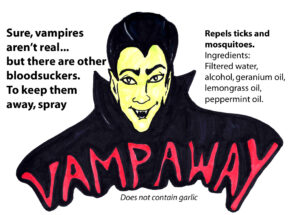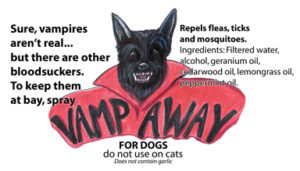Keeping pests away doesn’t have to be toxic
Several summers ago, I developed a recipe for a skin-friendly bug repellent I named Vamp Away. It is designed to repel ticks and mosquitos mainly, but with a few modifications, it can also be quite effective at repelling fleas and gnats.
I gave it the name that I did because it is meant to keep these little bloodsuckers away. I already had Lyme disease once and do not wish to get it again (although I am eternally grateful to the lone star tick that bit me; this forced me to give up meat, a measure that saved my kidneys!)
Geranium oil is very effective at repelling ticks, and is the main essential oil that I use, but it is also one of the most expensive essential oils to buy. If you want a good multi-purpose essential oil to repel both insects and arachnids, get yourself some peppermint oil. The National Institutes of Health have republished several studies that show its effectiveness as a repellent.
My original formula is for a two ounce spray bottle, a size that fits nicely into a purse, fanny pack, or pocket. Fill your bottle up 1/4 of the way (.5 oz. or 1 Tbsp.) with alcohol. I use an inexpensive vodka as it does not add any odor, but isopropyl alcohol is okay to use. The alcohol is in there to help the repellent dry quickly. Add 30 drops of geranium oil, 20 drops of lemongrass oil, and 10 drops of peppermint oil (if you want more protection against gnats, just double the amount of peppermint oil). Fill the rest of the bottle with filtered water.
This formula is safe for people, dogs, and horses. Never use products containing essential oils on cats! Many essential oils can trigger neurological problems in cats. The best thing you can do to keep your cat safe from parasites is to keep her indoors.
For flea protection, you can add 15 drops of cedar oil to the formula. I actually put a few drops of cedar oil on the surfaces outside my home that squirrels and chipmunks visit in an effort to decrease parasites. I’m not sure if this helps because I’m not exactly able to capture one of these little critters and examine their skin. What is more likely to reduce parasite populations is the diatomaceous earth that I apply to the ground when ticks are most likely to be present.
Diatomaceous earth works by adhering to the exoskeletons of parasites and insects, smothering them. That said, it can kill off beneficial insects as well, so should be used with discretion (leave it off of the plants you want pollinated, lupine, and milkweed).
Some effective essential oil based repellents for your yard are Cutter Natural Outdoor Fogger, which contains lemongrass oil, and Ecologic Lawn and Yard Insect Killer Spray, which contains cornmint oil, cinnamon oil, and peppermint oil. The Cutter works great on mosquitoes, but I haven’t found it to be all that effective against gnats. The Ecologic is much more multipurpose, and is quite effective on gnats. Once again, use discretion when applying these to avoid affecting beneficial insects.
When it comes to garden pests, your best non-toxic options are to find a neem oil based spray or encourage natural predators such as lace wings. These natural predators of aphids can be purchased, or you can create a home for them with items you might otherwise throw away.
I truly love lace wings! My neighbors probably think that I am crazy because I often talk to the lace wings in my yard. I make sure no lace wings are present if I am going to use something like neem oil. I also think twice before killing an earwig because earwigs too are beneficial as they also prey on common lawn pests.
If you have questions regarding beneficial insects, contact your county’s UW-Extension office. A horticulture agent can assist you with identifying insects, and will likely offer some good advice for encouraging beneficial insects in your yard.


